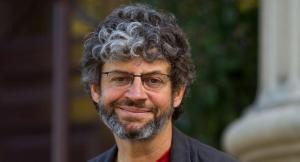The Future of Higher Education is in Our Intention and Actions Today
Part I (an opening)
Go, go, go, said the bird: human kind
Cannot bear very much reality.
Time past and time future
What might have been and what has been
Point to one end, which is always present.
T.S. Eliot, “Burnt Norton,” Four Quartets
In systems that exhibit little to no change, prognostication is rather straightforward: a living-out of Newton’s first law of motion. Unless poked somehow, stuff does as it does. However, in systems moving very quickly with larger and more chaotic changes, what comes along next is increasingly difficult to predict. As environments and questions become so complex, all we have is our own current stance: the guidance of our intention.
No one, not even Ray Kurzweil himself, knows what the platforms available to higher education will be, what job markets will look like, or what the implications of global change will be to learning, teaching, and living. No one. Whatever claim is made about the “future of higher education,” we must face this realization.
However, we do not need to know the future. Attending to and challenging our current intention guides our response to change and, moreover, provides the means to foster what arises next. Our actions have planet-wide consequences. If we only develop and teach techniques and do not cultivate an active inquiry into their implications, how can we ever expect to produce outcomes that foster systemic flourishing? As we think about the future of education, we must keep our focus on questions of “why” rather than simply “how.”
Our intention is the anchor we develop, the ground from which we respond, no matter what comes along. It is not merely reactive: since we are cultivating an ongoing inquiry into what is meaningful, challenging and deepening our intention is a living process which develops as we see what is created and fostered in this world. This process requires the support of a contemplative practice that sustains our courageous willingness to act in accordance with our beliefs.
Our intention is vibrant and alive, yet grounding and guiding. It is from this stance, here and now in the present, informed by our actions, that we must confront and create the future of higher education. This is what we must be cultivating in ourselves and in our institutions if we want to transform education and society.
Change is guided by intention and vision. In articulating and examining our mission, we will have a perspective to address questions like, “Should we use MOOCs?” Of course, the real question is: “What should we use MOOCs for?” For certain goals, MOOCs are just peachy; for others, rancid compost. And let’s face it: MOOCs are the first baby steps toward the radical changes coming for education transmission. What’s coming soon will be beyond our current imagination but can, and should, be formed and framed by our values and beliefs. It is our obligation to articulate our vision clearly and strongly, to act in accordance with our vision, and to foster this process of ongoing inquiry in our educational institutions.
Without this foundation, we will lurch in reaction to changes brought about by those with the most market and political power.
When students, teachers, staff and administration join together to articulate a vision for higher education in a united effort to create meaning and direction, every act becomes curricular: an opportunity for learning through questioning, “does this act cultivate a world consistent with my true intention?”
Our educational institutions should be environments which foster the realization that our actions shape the world into a reflection of what is most deeply meaningful to us. Information, theory, and innovation then become grounded in a process of living out meaning–no longer simply unleashed for any purpose. In this regard, higher education can lead the process of societal change and transformation.
It is only through a process of cultivating awareness and discernment that we can develop this sense of engaged meaning and action. This process must form the core of education, affecting political and social policies, technological development, and global awareness. It is essential for a vibrant society. Let’s all work together to create these environments and forge the future of higher education together–without succumbing to calls for narrow training and social control.
The future of higher education is in our intentions and actions today.
–
In part II, I will suggest ways to implement this inquiry and develop our intentions and actions.

Dr. Daniel Barbezat, Professor of Economics, Amherst; Executive Director, the Center for the Contemplative Mind in Society.
Daniel P. Barbezat is Professor of Economics at Amherst College. He has been a visiting professor at Northwestern University and Yale University and has taught in the summer program at Harvard University. In 2004, he won the J. T. Hughes Prize for Excellence in Teaching Economic History from the Economic History Association.
Over the past decade, he has become interested in how self-awareness and introspection can be used in post-secondary education, economic decision-making and creating and sustaining well-being. With the support of a Contemplative Practice Fellowship in 2008, he has developed courses that integrate contemplative exercises designed to enable students to gain deeper understanding and insight. His approach to these economic classes has been featured in the Boston Globe, the U.S. News & World Report, as well as on the NPR program “Here & Now.”
Dr. Barbezat has worked with the Center for Contemplative Mind in Society–the national hub for contemplative teaching and learning, committed to the positive transformation of the higher education system by supporting the use of contemplative/introspective practices to create engaged learning environments–as a Board Member, Treasurer and Associate Director of the Academic Program since 2009. In 2012, he became the Executive Director of the Center. He has lectured and led workshops on contemplative learning and pedagogy throughout the United States and Canada and is actively working to expand and deepen the Center’s programs, making its work more accessible and transformative for all.
Along with his experimental research on choice and awareness, he is currently editing a group of papers on examples of contemplative pedagogy across the disciplines with Arthur Zajonc to be published by Routledge, and writing (and thinking, thinking, thinking about…) a book entitled Wanting. His latest book (co-written with Mirabai Bush), Contemplative Practices in Higher Education: Powerful Methods to Transform Teaching and Learning, was released by Jossey-Bass in October 2013.
Reprinted by permission of the author, Spring 2014. For more articles and blogs published by the Center for the Contemplative Mind in Society, please visit:
